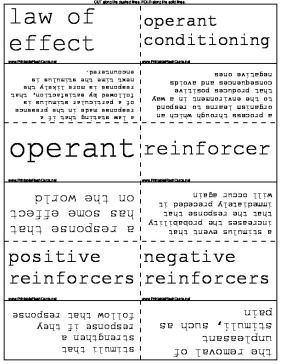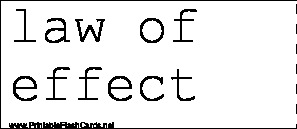

These flashcards will help you understand conditioning, which is an important idea in the study of learning.
There are 23 flash cards in this set (4 pages to print.)
To use:
1. Print out the cards.
2. Cut along the dashed lines.
3. Fold along the solid lines.
Sample flash cards in this set:




| Questions | Answers |
|---|---|
| law of effect | a law stating that if a response made in the presence of a particular stimulus is followed by satisfaction, that response is more likely the next time the stimulus is encountered. |
| operant conditioning | a process through which an organism learns to respond to the environment in a way that produces positive consequences and avoids negative ones |
| operant | a response that has some effect on the world |
| reinforcer | a stimulus event that increases the probability that the response that immediately preceded it will occur again |
| positive reinforcers | stimuli that strengthen a response if they follow that response |
| negative reinforcers | the removal of unpleasant stimuli, such as pain |
| escape conditioning | a type of learning in which an organism learns to make a particular response in order to terminate an aversive stimulus |
| avoidance conditioning | a type of learning in which an organism responds to a signal in a way that prevents exposure to an aversive stimulus |
| discriminative stimuli | stimuli that signal whether reinforcement is available if a certain response is made |
| shaping | the process of reinforcing responses that come successively closer to the desired response |
| primary reinforcers | reinforcers that meet an organism's basic needs, such as food and water |
| secondary reinforcer | a reward that people or animals learn to like |
| fixed ratio schedule | a partial reinforcement schedule that provides reinforcement following a fixed number of responses |
| variable-ratio schedule | a partial reinforcement schedule that provides reinforcement after a varying number of responses |
| fixed-interval schedule | a partial reinforcement schedule that provides reinforcement for the first response that occurs after some fixed time ha passed since the last reward |
| variable-interval schedule | a partial reinforcement schedule that provides reinforcement for the first response after varying periods of time. |
| learned helplessness | learning that responses do not affect consequences, resulting in failure to try to exert control over the environment |
| observational learning | learning to perform new behaviors by watching others |
| shaping | the process of reinforcing responses that come successively closer to the desired response |
| continuous reinforcement schedule | a pattern in which a reinforcer is delivered every time a particular response occurs |
| partial reinforcement schedule | a pattern in which a reinforcer is administered only some of the time after a particular response occurs |
| latent learning | learning that is not demonstrated at the time it occurs |
| cognitive map | a mental representation of the environment |